The Concept of ERP from the Perspective of Experienced Accountants and the Best ERP Software
Implementing an ERP system can bring numerous benefits to organizations, such as improved efficiency, better decision-making, streamlined processes, enhanced collaboration, and real-time data visibility across departments. It’s crucial for organizations to carefully assess their needs and goals before selecting and implementing an ERP solution.
What is ERP?
What is the concept of ERP? Generally, the concept of ERP for a company and organization that intends to continue its business activities means planning for the resources of an organization. These resources are not limited to one section of the organization, but rather encompass all sections of the organization.
Now that we understand what the concept of ERP is and for what purpose it is implemented in organizations. let’s summarize the above content to make it more understandable. The concept of ERP represent an organizational module that assists the organization in its path ahead, including production, sales, invoicing, and more, and automates complex organizational tasks and collaborations, facilitating and expediting actions.
The Concept of ERP
Do you know the concept of ERP? Do you know what this term means? In the above section, we made a general reference, but now we intend to clarify the concept of ERP in more detail. The concept of ERP is understood as a software solution and tool that controls and manages the activities of different sections of a company within organizations. The result of these actions is the improvement of operational status and an increase of organization’s sales.
What is the abbreviation of ERP?
what words make up the abbreviation “ERP”? In this section, we intend to introduce the abbreviated letters of the ERP concept and explain the meaning of each one based on the type of business within your organization. The concept of ERP consists of the words “Enterprise Resource Planning,” .
The word “Enterprise” refers to an organization and company, “Resource” refers to assets and supplies and human capital of organization, and finally, “Planning” signifies arrangement, scheduling and assignment Companies use ERP software to help consolidate data from multiple departments across the entire business in to one centralized data base. It leads to better decisions and options for business owners and managers accordingly.
General Features of ERP Software
After explaining the concept of ERP, in this section, we want to address general features of ERP software. Later on, we will also looking forward to introducing the best ERP software options, making it easier for you to select for your organization. You can see the general features of ERP software in the image below.
The mentioned points are the general features of ERP software that all of them possess. Therefore, when purchasing a software, you should consult with ERP experts before making a software purchase.
How to Choose a Suitable ERP System?
To select an appropriate software, what steps need to be taken? The answer to this question is quite clear. As mentioned in the concept of ERP, in order to choose a suitable ERP software, you need to be aware of your company’s objectives and requirements. You must understand the purpose and direction for which your organization has been established, and which needs are on the path of development and progress.
If you intend to improve the operational performance of your organization and are familiar with the concept of ERP, you should choose the best ERP software for your organization. You can proceed by visiting the Arin System ERP Software page.
Only by knowing your organization’s requirements can you make the right choice. The second point that helps you choose a suitable ERP system is that if you are not familiar with the software and its functioning, do not make a hasty decision. Consult with experts and specialists in this field first. The third point is to identify reputable ERP software providers.
Features of the Best ERP Software
Enterprise Resource Planning (ERP) software are intelligent tools that aid companies and organizations in enhancing various processes, including finance, production, inventory, human resources, and customer management. By integrating data and processes across all organizational departments, these software assist in better decision-making and increased efficiency. In this section, we have outlined some key capabilities of ERP software.
Integration of Data and Information: ERP software have the capability to integrate data and information from various departments and processes. This feature aids in more accurate and informed decision-making.
Financial Management: ERP software provide comprehensive financial tools, including accounting, budgeting, income and expense management, and financial analysis.
Supply Chain Management: ERP software offer complete supply chain management capabilities, including order management, production, and inventory management.
Human Resources Management: These software enable comprehensive management of employee information, salaries and wages, employee hierarchies, and internal communications.
Customer Management: Customer management features in ERP software encompass order tracking, customer communication, and customer behavior analysis.
Analysis and Reporting: ERP software provide data analysis capabilities and accurate reporting for effective decision-making.
With these capabilities, ERP software enhance productivity, coordination, and alignment within organizations, aiding managers in making better and more accurate decisions.
Why Should We Choose the Best ERP Software?
What is the reason for selecting the best ERP software? To answer this question, we need to clarify the subject a bit for choosing the best ERP software. At the beginning of the article, we mentioned that ERP software controls and manages the product lifecycle, production units, orders, supply chain, and various departments of an organization. For this reason, ERP is referred to as a modular system.
Choosing the appropriate ERP software ensures that the software aligns with the organization’s needs. The most crucial step any organization needs to take is organizational resource planning to integrate the business. Only ERP can assist the organization on this path. Organizational resource planning aids managers in selecting the right path and making appropriate decisions.
Factors for Choosing the Best ERP Software
Selecting the best ERP software for an organization requires a thorough assessment and consideration of several important factors. Below, we have outlined the factors involved in selecting the desired ERP software.
Organizational Needs and Objectives:
First, you need to identify your organization’s real needs and objectives. Should the desired system cover all organizational processes or only a portion of them?
- Organization’s Scale:
You must ensure that the chosen ERP software can be scaled to accommodate your organization’s growth and alignment.
- Industry Alignment:
Some ERP software is designed for specific industries. You need to make sure that the selected software is compatible with your industry type.
- Compatibility with Existing Systems:
You need to examine whether your chosen ERP software can easily interact with the systems already present in your organization. It should also allow data exchange.
- Customization and Configuration Capability:
The software should offer the capability to be tailored to your organization’s specific needs, allowing you to configure unique processes and workflows.
- Appropriate User Interface:
The software’s user interface should be user-friendly so that users can easily navigate and utilize it. Working with the software should not be complicated or difficult for your organization’s users.
- Costs and Implementation Time:
Consider the software cost, implementation expenses, and the time required for its deployment so that it doesn’t disrupt your staff’s performance and efficiency.
- Support and Updates:
The software should come with reliable support and update capabilities to ensure it can incorporate new features in sync with industry changes.
- Security:
Data security and access to information must be well-established in the chosen software.
- Technical Requirements:
Technical requirements such as compatible platforms, supported databases, and required programming languages should also be taken into account.
In the end, choosing an ERP software requires a thorough examination and comprehensive comparison of various options available in the software market. Additionally, seeking advice from experts in this field and leveraging the experiences of other organizations can assist you in making this decision.
Benefits of the Best ERP Software for Businesses
Now we would like to mention several advantages of ERP software, so you can fully understand what an ERP system is. The following points will assist the company in navigating the path of growth and progress more easily.
If we were to introduce the advantages of using an ERP system for your organization in a few instances, the following points are just a few of the benefits of utilizing ERP systems for organizations. Each organization can utilize these advantages based on their needs and circumstances.
Integration of Processes: ERP systems allow managers to oversee all organizational processes in a unified set. This enhances coordination and coherence in decision-making and organizational performance.
Increased Efficiency: By optimizing and automating processes, the time and resources required for tasks are reduced, leading to improved efficiency.
Better Access to Information: ERP systems collect and provide information related to various departments and processes of the organization on a shared platform, increasing accuracy and trust in information.
Improved Decision-making: With access to up-to-date and analyzable data and reports, organizational managers can make better decisions and formulate business strategies.
Cost Reduction: High productivity, reduced repetition and errors, and enhanced resource management lead to a reduction in operational costs.
Error Prevention: These systems, by allowing access to data and precise control, assist in preventing mistakes and issues in processes.
Regulatory Compliance: ERP systems help organizations align with industry regulations and standards.
Real-time and Consistent Information: Changes in one part of the organization within the ERP system automatically affect other sections, ensuring information updates.
Enhanced Interaction and Communication: Improved access to information and increased internal interactions lead to greater collaboration and knowledge sharing.
Improved Customer Experience: Up-to-date customer information in the ERP system improves services and responsiveness to customer needs.
Values of ERP Software for Large Businesses
The structure of ERP is designed in a way that the organization’s information and data are placed within the ERP system. In fact, organizations can utilize this opportunity to integrate their business, leading to savings in both time and organizational resources. The most significant values of ERP software for enterprise resource planning are included in the table below:
| row | ERP Software Values |
| 1 | Viewing Financial and Accounting Matters |
| 2 | Organizational Procurement Control |
| 3 | Risk and Organizational Resource Management |
| 4 | Enhancing Employee and User Collaboration |
| 5 | Automatic Customization Capability |
| 6 | Task Automation |
| 7 | Invoicing Presentation |
In fact, ERP (Enterprise Resource Planning) software holds numerous values for large businesses that aid in enhancing organizational performance and management. In addition to the items mentioned in the table above, the following are other crucial values of ERP software for large businesses:
Process Integration: ERP integrates various processes, including finance, production, distribution, sales, and HR, within a unified environment. This fosters better coordination and improved decision-making.
Enhanced Data Accessibility: ERP software collects different information in a common database, providing users with easy access to data. This results in better data-driven decision-making.
Improved Efficiency: By optimizing and automating processes, ERP reduces the time and resources required for tasks, leading to increased efficiency.
Reporting and Analysis Consolidation: ERP software offers accurate and up-to-date information to managers through reports and analyses, facilitating strategic decision-making.
Cost Reduction: Improved productivity, reduced repetition, error reduction, and better resource management contribute to operational cost savings.
Error Prevention: Accurate process control and up-to-date data access minimize the likelihood of errors.
Human Resource Management: ERP software enables optimal human resource management, including recruitment, training, compensation, and performance evaluation.
Scalability: ERP systems need to be scalable with organizational growth, allowing for easy addition of new modules and accommodating changes.
Support for Strategic Decision-Making: By providing accurate data and reports, ERP systems empower managers to make strategic decisions based on reliable information.
Compliance with Regulations and Standards: ERP systems typically align with industry standards and regulations, helping organizations avoid legal complications.
In conclusion, ERP software assists large businesses in improving performance, productivity, and coordination, while also providing more accurate information for strategic decision-making by managers.
Tips for Selecting the Best ERP System
Choosing the best ERP system might initially seem a bit difficult and challenging, but with an understanding of the selection factors, you can easily have the best ERP system by examining the criteria and factors. Knowing these criteria will provide you with a deep insight and a broader perspective on your organization’s issues and capabilities. The tips for selecting the best ERP system include:
- Understand the ERP Market: This factor implies that you should recognize various types of top ERP software and consider using Cloud-Based systems. Examine the demand for ERP.
- Discover and Define Your Business Needs: In this factor, for the best ERP software, you must identify your organization’s goals and needs, allowing you to address the organization’s challenges.
- Create a General Outline of Your Core Requirements: An organization might have multiple objectives and needs. Therefore, before choosing the best ERP software, it’s better to have a comprehensive list of the organization’s core requirements prepared so you can make a more informed and profound purchase decision.
- Compile a List of ERP Software Providers: Why limit yourself to a single store? List organizations and companies offering the best ERP software and compare and scrutinize their products.
- Request Demos from Software Providers: Before purchasing and selecting ERP software from a provider, request a demo to have access to its functionality. This way, you can learn how to use the software and confidently make your purchase.
- Decision-Making: If you have completed the above steps, you can now negotiate with your organizational team to purchase the best ERP system that aligns with your business.
If you want to prevent your institution’s ERP planning system from encountering failure, we recommend reading the article “10 Early Warning Signs of ERP System Failure” for valuable insights.
Purchasing the Best ERP Software in Iran
We aim to prepare you for purchasing the best ERP software. We’ve outlined some features that were general characteristics of any software, and now we would like to mention several attributes of the best ERP software in Iran so that you can make a suitable and informed choice for your organization. You can see the features and capabilities of the best ERP software in Iran in the image below.
Purchasing Arian System ERP Software
After providing a comprehensive explanation of the ERP concept, it is now time to introduce you to the best ERP software. One of the top software options in this field is Arian System ERP, which effectively organizes and integrates organizations and companies. By purchasing Arian System ERP software, you can easily manage various aspects of your organization and save time.
ArianERP software, designed for large and medium-sized companies, comprehensively manages all organizational resources. Through various modules of the Arian System software, including business accounting, financial accounting, human resources, administration, production, the Modian system, maintenance, and repair, everything managers need to manage their organizational departments is provided. The process-centric nature of Arian System software automates many time-consuming tasks within the organization, giving managers complete control over all organizational affairs.
Some of the features that set Arian System ERP apart from its competitors include:
- Automatic issuance of accounting documents
- High information security and user-friendly interface
- Iranian ERP software complying with global standards
- Process-centric approach with professional form-building and reporting tools
- Provision of customized reports tailored to customer business needs
- Availability of Windows version for large organizations with infrastructure provisioning
- Availability of 2 web and cloud-based versions for unrestricted software access
- And more…
To purchase Arian System ERP software, you can get in touch with the company’s experts who can assist you in selecting the best ERP software. Some may wonder why they should invest in an ERP system. If you also have this question, we recommend reading the article “10 Reasons to Purchase an Organizational Resource Planning System.”
Conclusion
The concept of ERP for a company or organization intending to continue its business activities involves planning for the resources of an organization. These resources are not limited to a single department within the organization but encompass all sections. Departments such as human resources, production, assets, and more are included, aiming to enhance sales and achieve desirable outcomes for the organization.
In this article, we’ve explained the ERP concept and highlighted its features and benefits. Alongside elucidating the ERP concept, we’ve endeavored to introduce you to the best organizational resource planning software. This way, you can make informed decisions and enhance the state of your organization. If you have any opinions or questions, feel free to write them in the comments section.
here’s a summary of the article in 7 bullet points:
- ERP (Enterprise Resource Planning) involves planning resources across all organizational departments for improved outcomes.
- ERP is essential for businesses aiming to enhance efficiency, sales, and overall performance.
- The article introduces ArianERP as a top ERP software designed for medium and large companies in Iran.
- ArianERP seamlessly manages various organizational areas, such as HR, finance, production, and administration.
- Unique features of ArianERP include automated accounting documents and user-friendly interface.
- The software aligns with global standards and offers both Windows and web-based versions for flexible accessibility.
- The article concludes that understanding ERP and choosing the right software can improve organizational performance.
Feel free to ask if you need further information or clarification!
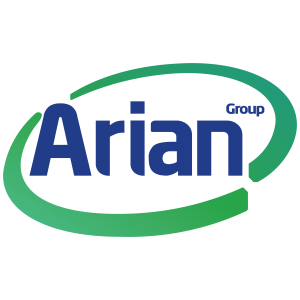
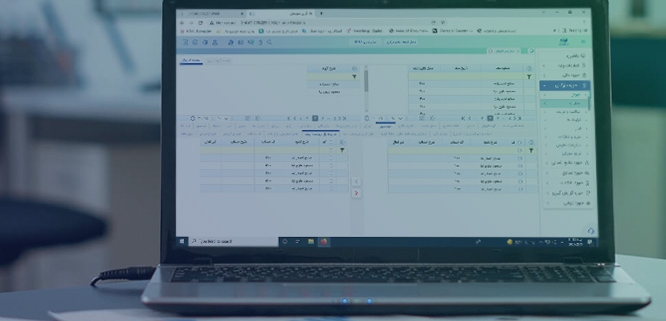 ariansystem
ariansystem
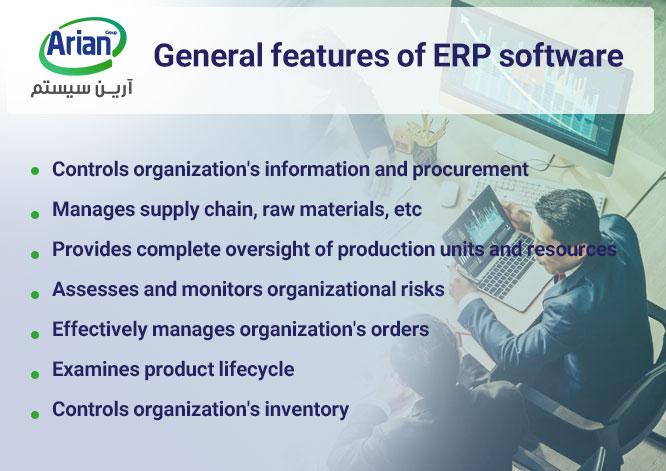
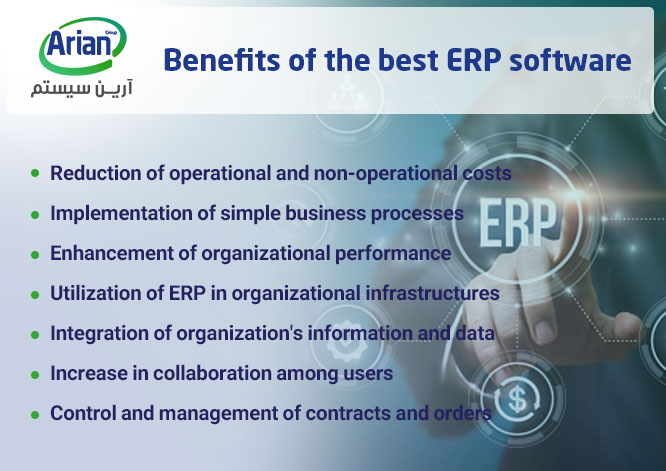
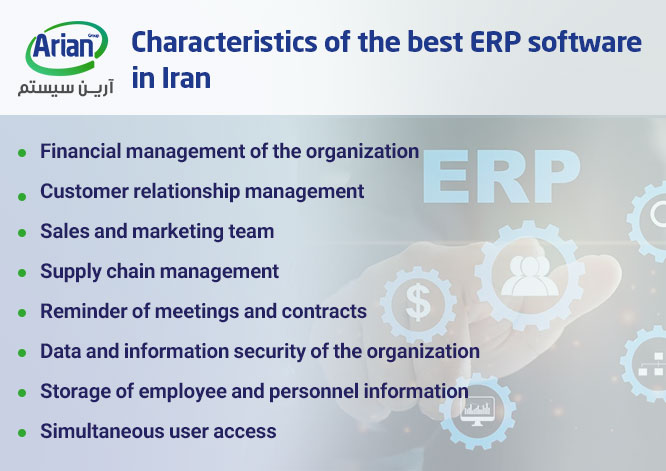

Leave a Reply
Want to join the discussion?Feel free to contribute!